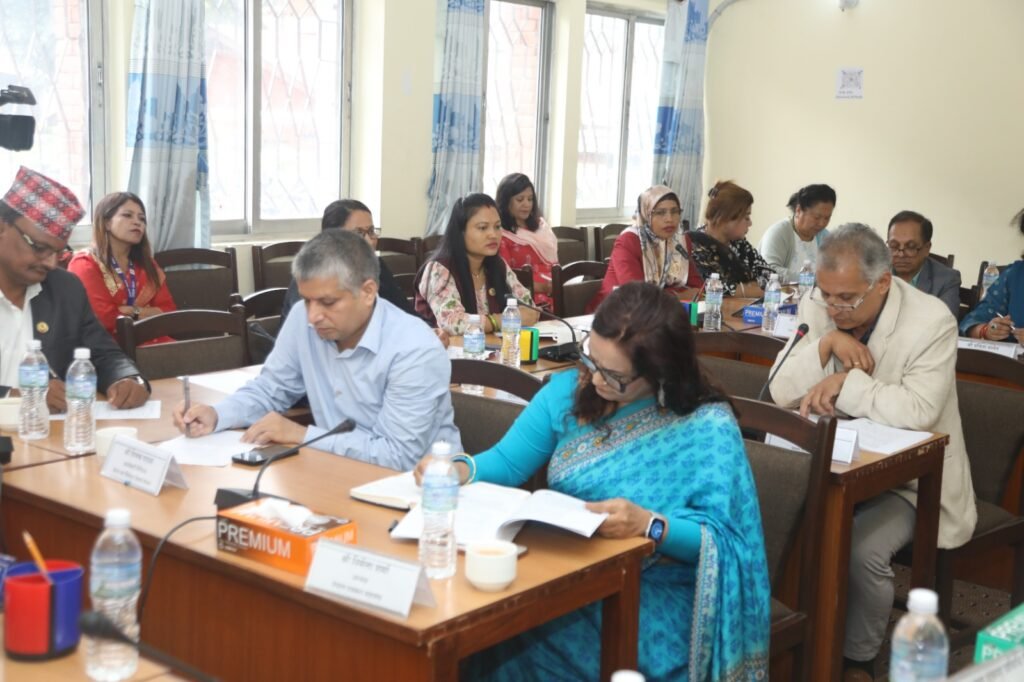On July 28, 2025, the Center for Media Research – Nepal (CMR-Nepal) was invited by the Education, Health and Information Technology Committee of the House of Representatives of the Federal Parliament of Nepal in a consultation meeting with CSOs/experts on the Media Council Bill.
Executive Director Mr. Tilak Pathak represented CMR-Nepal in the deliberations; and presented CMR-Nepal’s summarized submission.
The submission is based on the in-depth review of the bill by CMR-Nepal. The policy review and submission brief in written were also submitted to the committee members.
Below is the outline of the CMR-Nepal’s submission:
Suggestions from the Center for Media Research–Nepal (CMR-Nepal) on the Bill to Amend and Consolidate the Laws on the Media Council
On the Purpose of the Bill
The bill states that there is a “new need for the establishment and operation of the Media Council as an autonomous regulatory body for the development and protection of fair, independent, and accountable journalism by maintaining professional conduct in the field of journalism and promoting self-regulation.” In line with this stated purpose, it is essential to emphasize the autonomy of the Media Council and design mechanisms that ensure its independence in both structure and function.

On the Need to Enact a New Law
The constitutional reference to “any other type of digital” and the need for “managing and regulating other media” appears to include social media, which makes this law necessary in the current media landscape.
Furthermore, in the context of improving relations with the World Press Council, South Asian press councils, and similar international bodies, renaming the Press Council of Nepal to “Media Council” is more than symbolic—it signals a substantive shift. The government’s own policies and programs state that the council will be developed as an independent, autonomous, and competent body to hear complaints related to violations of the journalistic code of conduct. This intention should be backed by concrete legal guarantees of autonomy.
The bill also mentions the need to establish the Media Council in line with principles of proportionality and inclusion. Therefore, these principles should be meaningfully integrated into the council’s formation and functioning.
On the Mandate of the Media Council
The Council is empowered to issue and enforce the journalistic code of conduct, monitor compliance, and take action in case of violations. It is also tasked with managing accreditation for press representatives. These responsibilities are welcome and should be retained in the final legislation.
On the Qualifications of the Chairperson and Members, and the Recommendation Committee
The bill proposes that the Chairperson’s qualifications be equivalent to those of a Supreme Court judge. However, the proposed appointment mechanism—a three-member committee composed of a government-appointed expert, a joint secretary, and coordinated by the secretary of the ministry—seems inconsistent with the high level of independence the role demands.
A better alternative would be a recommendation committee that includes the Speaker of the National Assembly, the Chairperson of a relevant Parliamentary Committee of the House of Representatives, and the Minister of Information and Communications.
Given that the appointment committee is currently dominated by government officials, there is a risk of political influence. For the Media Council to function impartially, autonomy must be ensured from the appointment stage. Therefore, involving parliament in the selection process is critical to safeguarding independence.
On the Provision for Removal of the Chairperson or Members
The clause allowing the removal of the Chairperson or members for “lack of efficiency” or “failure to fulfill responsibilities” is problematic. Vague grounds for removal risk enabling arbitrary government interference, which may lead to council members being unduly loyal to the government rather than acting independently.
On the Provision for Acting Leadership
Section 14(2) of the bill states that in the absence or suspension of the Chairperson, the member mentioned in Clause (b) of Sub-section (1) of Section 6 will act as Chairperson and convene meetings until a new Chairperson is appointed. Since this provision may result in a joint secretary leading the Council, it risks bureaucratic control and increases the possibility of government interference—contrary to the principles of independent journalism and the intended autonomy of the Council.
In both the recommendation process and the provision for acting leadership, bureaucratic dominance is concerning. This structure could reduce the Council to a government unit rather than an autonomous regulatory body. The provision should be reconsidered accordingly.
On Coordination with Provincial Media Councils
With federalism in place, provincial media councils are being formed and, in some cases, are already operational. This may create confusion among media outlets regarding whose directives to follow. There is also a risk of duplication of roles between federal and provincial bodies. To address these challenges, the bill should include provisions for coordination between federal and provincial media councils to ensure clarity, efficiency, and coherence in media regulation.
Access the PDF of the Policy Review of the bill here (in Nepali).
